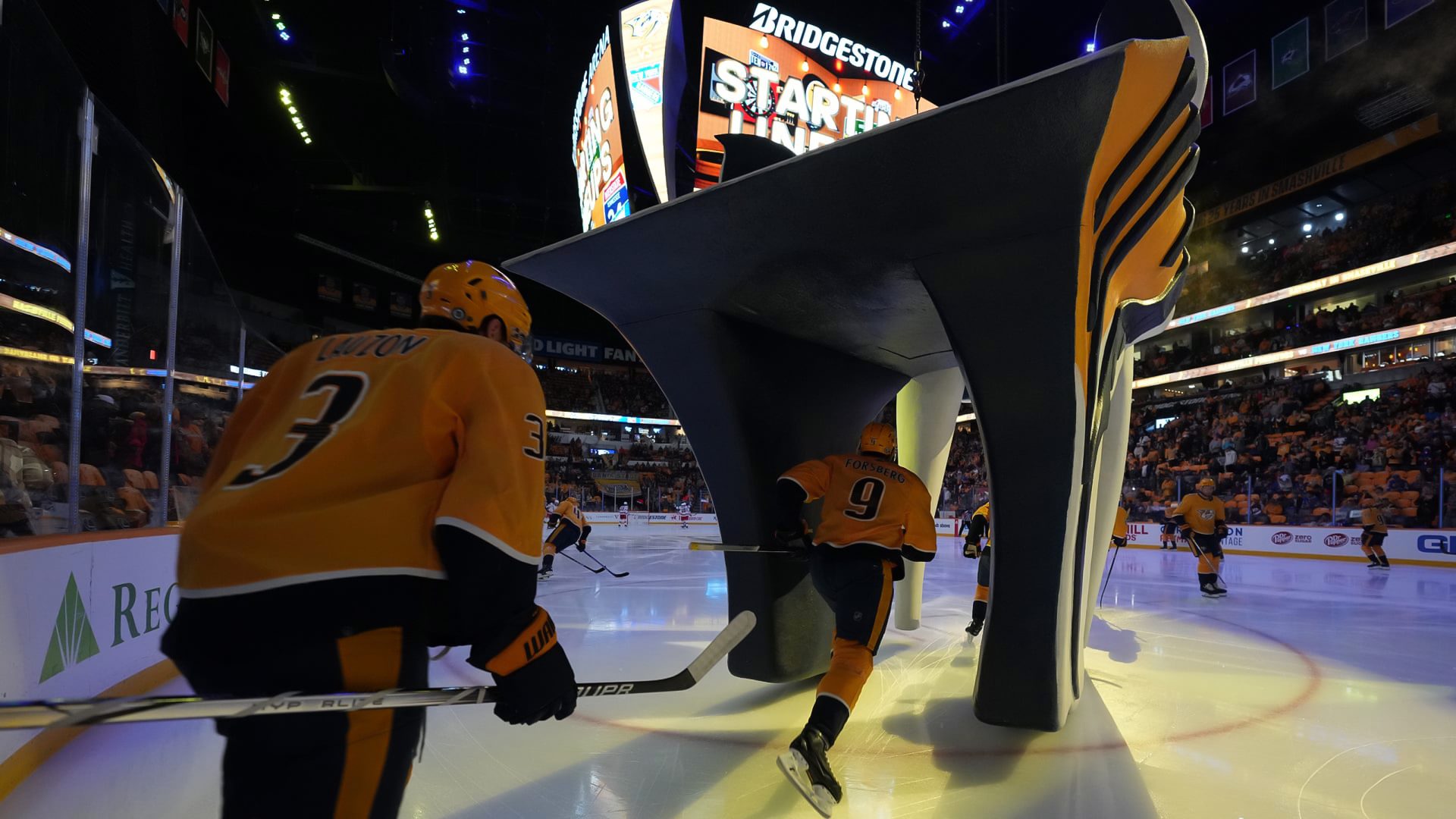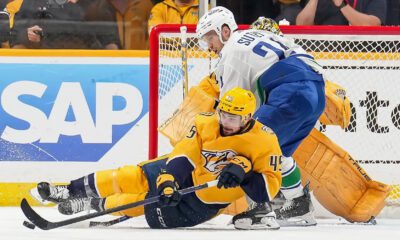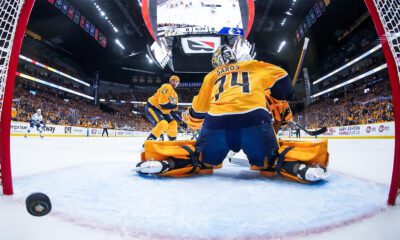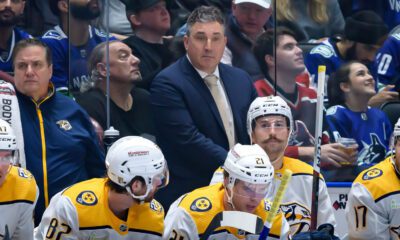Nashville Predators
Commentary: New Predators Regime Should Stop Resisting Change

With just one game left before the All-Star break, the Nashville Predators have some serious questions in front of them.
They’ve shown flashes of being a good team, but they are far from being an elite team. So, what are fans to do with that?
Most remain confident in general manager Barry Trotz and head coach Andrew Brunette, but this good-versus-elite dichotomy is what plagued former GM David Poile for years, and it’s the first internal realization the team needs to make.
The front office cannot let itself be convinced that this version of the Predators is on the cusp of being a contender. Even in close games, the distinction between them and the top-tier teams is stark.
Look no further than the 4-1 road loss to the Golden Knights on Jan. 15 and the 4-1 home loss to the Florida Panthers on Jan. 22. Both opponents were conference champions, and both were simply in a different league.
Anyone claiming otherwise or possibly searching for an underlying metric to argue the games were closer than the score indicated is missing the forest for the tress because the eye test was all the analysis needed for those two matchups.
The successful teams are the ones who bring a mixture of speed, skill and determination; the ones who make every aspect of the game feel like a battle. Nashville’s opponents are controlling those battles right now, and it’s clear change is needed.
This week should start some roster revamping. Now is the time for Trotz and Brunette to do what they were brought to Nashville to do, and that starts by cutting ties to how things were done in the past. Nashville’s future is bright, but the front office needs to have the resolve to actually want to get there.
Trading Ryan Johansen to the Colorado Avalanche over the summer (basically for free after Alex Galchenyuk was not re-signed) and retaining $4 million for the next two seasons, while also buying out Matt Duchene (who will have dead cap hits of $2.55M this season, $5.55M next season, $6.55M in 2025 and $1.55M from 2026 through 2028) demonstrated that Trotz was prepared to move forward.
Parting with both players was done in vain unless the roster-overhauling process is continued. The team is not any better today in its current state than it would be if Johansen and Duchene were both still around.
Yes, the Predators are in the entertainment business, and revenue from playoff games matter, but just getting to the postseason is no longer good enough. Getting swept in the first round of the playoffs is no longer preferrable to potentially drafting franchise-changing players like Connor Bedard, Adam Fantilli or Leo Carlsson. Other than the few seasons after the 2016-17 Stanley Cup Final, the Predators have been a terribly average team with a mentality that comes off as scared of making the hard decisions for fear of being truly bad.
Though it may ruffle some feathers, Brunette will not succeed, nor will his system, with the roster’s current makeup. He doesn’t have the horses for the race he’s trying to run. The roster is not filled with bad players necessarily, it’s just not filled with the right players.
As Herb Brooks said in the move “Miracle” to his assistant Craig Patrick: “I’m not looking for the best players, Craig, I’m looking for the right ones.”
As the Predators went up 3-0 in the first period of their 4-3 overtime loss to the Ottawa Senators on Monday night, I applauded Brunette for mixing things up and permitting the players to play their game.
When you let players play to their strengths instead of forcing them into a system-based role, they show you what they’re made of. It’s going to continue to take time, but Brunette is doing a good job of seeking to open up the roster and letting the players succeed. Tonight is a…
— Clay Brewer (@ClayBrewer10) January 30, 2024
The irony was not lost on me after the team later collapsed, blowing a three-goal lead in the second period before falling in overtime, leading me to question several things about the Predators current makeup.
The irony of me tweeting this in the first period last night to only have the opposite come to light during the second, third, and OT when things get tough is not hidden from me. One game isn’t a big deal, but when things become a trend, serious questions need to be raised #Preds https://t.co/uYso70SUEb
— Clay Brewer (@ClayBrewer10) January 30, 2024
The foundation
In my opinion, there are five untouchable players on Nashville’s NHL roster: goaltender Juuse Saros, defensemen Roman Josi and Ryan McDonagh, and forwards Filip Forsberg and Ryan O’Reilly. I like to refer to them as “the foundational five.”
And by untouchable, I don’t mean if a generous offer comes Trotz’s way he should hang up the phone; I’m simply saying those five players are the foundation of what the Predators future should be built on.
The reason I chose those five players is because they each serve a purpose in the future trajectory of the team’s success. The Brunette way is not the Predator way, but that’s the very point of why his hiring was a turning point in the history of the franchise.
To accompany the foundational five above, I’ve also tabbed a “Milwaukee six,” referring to Egor Afanasyev, Joakim Kemell, Fedor Svechkov, Spencer Stastney, Marc Del Gaizo, and Yaroslav Askarov. Those six players should be incorporated into Nashville’s NHL roster sooner rather than later.
Sorting out the goalies
The Predators need to address their goaltending logjam, not just for this season but for next as well.
A few weeks ago, I posed three crucial questions that face the Predators at the halfway point of the season. I suggested that Trotz should listen to teams calling to inquire about Saros but mentioned that he shouldn’t send off his 1A to the first good offer to come his way.
The notion that Saros could even be dealt later made headlines when The Athletic’s Pierre LeBrun reported that it would take a “young, front-line NHL player” for Trotz to even listen to any offers.
Kevin Lankinen is a legitimate starting-caliber NHL goalie. He’s not a backup by skill; he’s a backup because he’s playing behind Saros, one of the league’s elite. Lankinen’s value is by no means diminished because of this, and he should be shopped to goaltender-needy playoff contenders.
With the goaltender market being what it is, Lankinen could fetch a mid-draft pick in return. This opens the door for Saros and Askarov to finish the year together as a 1A/1B tandem leading into next season, where the true question of which one is Nashville’s goaltender of the future can be settled on the ice.
What about the defense?
We’ve already established that Josi and McDonagh are a part of the foundation. And Luke Schenn and Jeremy Lauzon satisfy physicality and culture purposes for now, leaving Barrie, Fabbro, and Carrier as the defensive wild cards.
Barrie is likely on his way out the door soon after making his desires clear on that front, and his lack of playing time suggests that the Predators likely share that desire.
Carrier suffered an injury during Monday’s loss, and if serious, it likely means that Stastney could be recalled soon.
The Predators need to decide which of Carrier or Fabbro they see as part of the team’s long-term vision. In a perfect world, Carrier would have been Ryan Ellis’ replacement and Fabbro would have been P.K. Subban’s.
The offensive production hasn’t panned out that way, but they’re both still young enough to fill a specific role. I’m not married to either one, and Nashville doesn’t need to be married to both. Both players have value and would receive it on the trade market. If I had to choose, I’d favor Fabbro due to his natural chemistry and solid performance when paired with Josi.
Nashville already has one NHL-ready defenseman in Milwaukee in Stastney. Del Gaizo may not be at Stastney’s level, but he’s awfully close, and don’t forget about Jake Livingstone, who also isn’t too far away in his development either. All three could have a case for earning some NHL minutes down the stretch.
An eye toward the future
As I have stated before, Brunette’s system is one that’s fully involved offensively and it reminds me of the Barcelona soccer team of the Pep Guardiola days. Each position reinforces the other, and if you do not have the right players to do that reinforcing, then it’s not going to work.
This is why I am adamant that the Predators do all they can to acquire another top-of-the-lineup scorer like Andrei Kuzmenko from the Vancouver Canucks. He adds a scoring touch that reinforces the first line’s offensive production.
Nashville is a team ripe with depth pieces that would be valuable commodities for a true contender to add. The team also has a bevy of talent in Milwaukee that better suits Brunette’s coaching philosophy and better matches the retooling process the Predators should be taking.
The Predators have eight unrestricted free agents this summer (Yakov Trenin, Denis Gurianov, Tommy Novak, Michael McCarron, Kiefer Sherwood, Tyson Barrie, Alex Carrier, and Kevin Lankinen) and two restricted free agents (Philip Tomasino and Dante Fabbro).
It’s possible that all of the Milwaukee six could fill empty spots next year vacated by any of those UFAs and RFAs.
The Predators should choose at least four players from their upcoming free-agent class who fit their system and retooling process that they can build with next season (for me personally, it would be Fabbro, Novak, Gurianov, and Tomasino).
Accordingly, the Predators should approach February as a checkpoint to evaluate the current roster and start implementing pieces of the future. But what does that look like?
The first step is understanding that cap space and roster flexibility are currently the most valuable commodity in the NHL, and not every trade results in winning the lottery.
Nashville should offload some depth players that either have high value to other teams or do not fit Brunette’s new system — Trenin, McCarron, Sherwood, and perhaps even Colton Sissons are names that come to mind here. They all bring different skillsets, have minimal salaries, and could fit on almost any roster given their respective specialties. These aren’t bad players. It’s just time to make the tough decisions.
Depth players are necessary for success, but having too many only hinders the production of others. A prime example is Nashville having Gurianov skate with Sissons and Trenin on the second line. I like both Trenin and Sissons, but they won’t help develop Gurianov become a goal scorer. That’s not their job.
Cole Smith’s recent contract extension solidifies his spot as one of the depth pieces that fits into the Predators’ long-term plans. They need to choose one or two others to maintain their physicality and grittiness while offloading the rest.
Tying it all together
The Predators could conceivably come out of the March 8 trade deadline with a newly revived 23-man roster. If they aren’t happy with that result, they have flexibility with what they have in Milwaukee to mix and match some of their depth players.
Tomasino will lose his waiver-exempt designation if he plays in 11 more games this season, but everyone else who’s waiver exempt stays that way through the end of the year, including Luke Evangelista and Juuso Parssinen, who was recently assigned to Milwaukee.
Nashville’s goal should not be to cash in on every asset and try to fleece as many teams as possible. Tanner Jeannot-for-the-lot trades only come around every once in a while, so that shouldn’t be looked at as the standard.
With the remaining 30-plus games this season, the Predators’ goal should be to establish an environment that allows Brunette’s system to work with a roster that doesn’t hold anyone back, particularly those in Milwaukee.
The biggest issue with the current Predators roster is its (lack of) flexibility, which is the key to unlocking its promising future.
Follow Clay Brewer on Twitter/X: @ClayBrewer10
Be sure to follow Nashville Hockey Now on X/Twitter, Facebook, YouTube and Instagram.
















